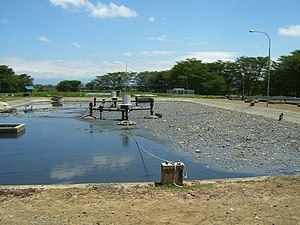
The treatment of wastewater using conventional methods consumes significant amounts of energy.[1] . However, wastewater contains biochemical energy, which can be harnessed rather than discarded as pollution. Biochemical oxygen demandW is a measure of pollution, but also indicates the energy content of the wastewater.
Methods of Extracting Energy[edit | edit source]
- Biogas Production: Biogas can be generated from wastewater through anaerobic digestion. This process converts organic matter in the wastewater into methane and carbon dioxide, which can be used as a renewable energy source.
- Various waste-to-energyW technologies including incinerationW can be used to dispose of solid waste. This includes dried sewage sludge.W They can be incinerated to produce energy. This method is efficient for disposing of solid waste while generating heat and electricity.
- Microbial fuel cells{{W (MFCs): MFCs are an emerging technology that uses bacteria to convert organic matter in wastewater directly into electricity. The BioElectrochemically Assisted Microbial Reactor (BEAMR) method is a notable development in this field, capable of producing four times the hydrogen compared to fermentation alone.[2]
Benefits of Energy from Wastewater[edit | edit source]
- Sustainable Energy Source: Utilizing wastewater for energy production provides a sustainable and renewable source of energy.
- Pollution Reduction: Converting biochemical energy in wastewater into useful energy reduces pollution and helps in waste management.
- Cost Savings: Generating energy from wastewater can reduce the operational costs associated with wastewater treatment facilities.
Challenges and Considerations[edit | edit source]
- Technological Development: While methods like biogas production are well-established, technologies such as MFCs are still under development and require further research and investment.
- Economic Viability: The initial investment in infrastructure for energy extraction from wastewater can be high, but long-term benefits can offset these costs.
Real-World Applications[edit | edit source]
- Municipal Wastewater Treatment Plants: Many municipalities are adopting biogas production to generate energy from wastewater, reducing their reliance on non-renewable energy sources.
- Industrial Applications: Industries producing high volumes of organic wastewater, such as food and beverage manufacturing, are utilizing these technologies to manage waste and produce energy.
Harnessing energy from wastewater presents a promising avenue for sustainable energy production and waste management. By using technologies such as biogas production and microbial fuel cells, we can reduce environmental impact, save costs, and move towards a more sustainable future.
Notes[edit | edit source]
- ↑ According to one estimate, "In the USA... 5% of electricity we produce is used to treat water and wastewater." - from Microbial Fuel Cells, B.E. Logan, 2005. Does this include the cost of contructing colleciton and treatment facilities, including the embedded energyW in the materials?[expansion needed]
- ↑ 2005 Popular Mechanics Breakthrough Awards (published in the November 2005 issue). According to this update (Nov 2007) efficiency has reached 82%. For more information, see Microbial Fuel Cells, by Bruce Logan of Penn State University (2005), who won a 2005 Popular Mechanics Breakthrough Award.[1][dead link]